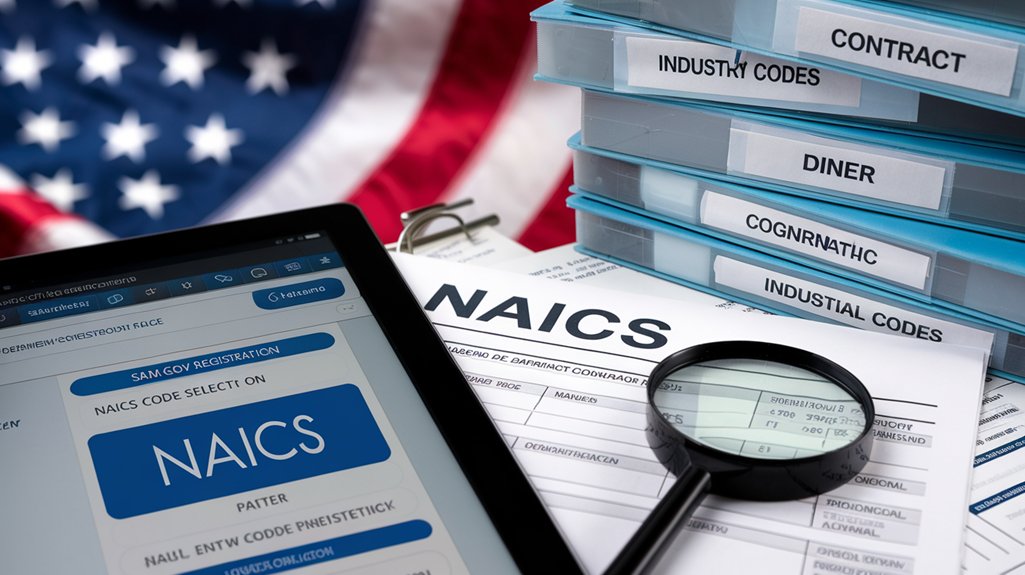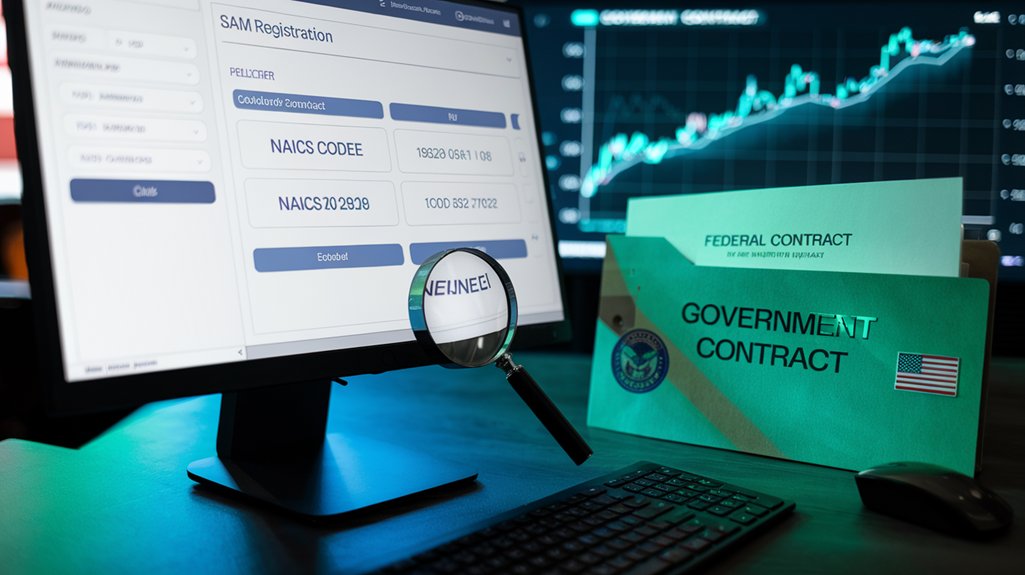NAICS codes in SAM registration determine a business’s eligibility for government contracts. These codes categorize companies by industry, directly impacting which opportunities appear in searches and which set-aside programs businesses qualify for. Strategic selection guarantees visibility to relevant contracting officers while maintaining compliance with SBA size standards. Regular verification and updating of codes helps businesses stay aligned with their operations and maximize potential contract opportunities. Proper classification reveals numerous competitive advantages in the federal marketplace.
The Role of NAICS Codes in Government Contract Eligibility

When businesses seek government contracts, understanding NAICS codes becomes essential for determining eligibility and accessing opportunities. These industry classification codes serve as the foundation for how federal agencies categorize and assign contracts to qualified vendors. Poor code selection can lead to missed opportunities and potential compliance issues during the contracting process.
NAICS relevance extends beyond simple identification, as these codes directly impact which contracts a business can pursue. Government contracting officers use these codes to set aside opportunities for specific business types, making proper code selection critical for visibility. SBA uses NAICS codes to establish size standards for small businesses, determining eligibility for designated contracts.
The strategic selection of NAICS codes directly determines your contract eligibility and marketplace visibility.
The eligibility criteria for many federal programs, including 8(a) and SDVOSB certifications, are tied to appropriate NAICS codes listed in a company’s SAM profile. During registration on SAM.gov, businesses must designate a primary NAICS code that best represents their main business activities.
Businesses must regularly verify their NAICS codes match their actual operations to maintain compliance and maximize contract accessibility within their industry classification.
Maximizing Business Opportunities Through Accurate NAICS Classification

Selecting the right NAICS codes fundamentally transforms a business’s access to government contracts and market opportunities.
Companies that strategically identify their most relevant classifications gain significant advantages in competitive positioning and revenue generation.
Accurate NAICS classification enables businesses to conduct targeted market analysis across their specific industry segments, revealing valuable insights about competition and growth potential.
Organizations can leverage this data to benchmark their performance against competitors and identify emerging industry trends that influence strategic planning.
When businesses align their NAICS codes with their primary revenue-generating activities, they position themselves to discover new opportunities for expansion.
This strategic alignment helps companies identify untapped markets, evaluate potential business partnerships, and develop data-driven approaches to gain competitive advantages in their respective sectors.
The self-assigned system allows businesses to select codes that best reflect their actual operations, ensuring they receive appropriate consideration for industry-specific opportunities.
Federal marketplace participation requires careful consideration of NAICS codes to ensure eligibility for government contracting opportunities.
Strategic Benefits of Proper NAICS Codes in Your SAM Registration

The proper application of NAICS codes within SAM registration extends beyond mere classification to deliver tangible strategic advantages for businesses seeking government contracts.
Accurate NAICS codes guarantee strategic alignment between a company’s capabilities and government procurement needs, greatly improving visibility to contracting officers searching for specific services or products. Understanding the industry classification system is fundamental to successful government contracting outcomes.
Effective procurement matching occurs when businesses select NAICS codes that precisely reflect their operations, connecting them with relevant solicitations while filtering out inappropriate opportunities. This precision optimizes resource allocation by focusing bid preparation efforts on winnable contracts.
Additionally, proper classification enhances market research integration, positioning companies to better understand competitive landscapes and government spending patterns within their industries. Small businesses especially benefit when they select codes that align with their primary economic activities, as this directly impacts their eligibility for specialized set-aside contracts and assistance programs.
Businesses with accurate NAICS codes gain competitive advantages through improved targeting and industry-specific networking opportunities. Companies should regularly review and update their NAICS selections to ensure they reflect any changes in operations, maintaining eligibility for emerging contract opportunities.
Frequently Asked Questions
How Often Are NAICS Codes Updated Nationally?
NAICS codes undergo updates on a consistent five-year cycle, with the most recent code revisions occurring in 2022.
These regular NAICS updates guarantee that industry classifications accurately reflect current economic conditions across North America. The federal government implements these changes systematically, typically beginning the shift process in the third or fourth quarter of the release year.
Organizations must adapt to these revisions to maintain accurate industry classification. The next scheduled update will occur in 2027.
Can Foreign Businesses Use NAICS Codes for SAM Registration?
Yes, foreign businesses can and must use NAICS codes when registering in SAM.gov.
International entities follow the same classification requirements as U.S. companies, selecting codes that accurately represent their business activities.
Foreign companies must obtain an NCAGE code first, then assign appropriate NAICS codes to their registration.
This standardized classification system guarantees proper matching with relevant contract opportunities and maintains consistent data across all SAM registrants, regardless of country of origin.
How Many NAICS Codes Can One Business Register Under?
A business can register under multiple NAICS codes during SAM registration to reflect its various services and products.
While there is no strict technical limit, businesses typically should not exceed 10 NAICS codes. This guideline helps maintain clarity about the company’s primary industry classification and core expertise.
Registering under too many codes may dilute a business’s perceived specialization, potentially affecting its visibility and selection for government contracts that align with its true capabilities.
What Penalties Exist for Incorrect NAICS Code Registration?
Businesses providing incorrect registrations in SAM face severe consequences.
These include suspension or debarment from federal contracting, monetary fines, and termination of existing contracts.
Administrative penalties may involve registration revocation, preventing access to future opportunities.
Compliance risks extend to payment withholding and potential legal proceedings.
The government may also demand reimbursement of funds already received.
Regular review and accurate updating of NAICS codes help businesses avoid these penalties.
Can NAICS Codes Affect My Business Credit Score?
Yes, NAICS codes can impact business credit scores. Lenders and credit bureaus use NAICS classification to compare a business against industry peers when evaluating creditworthiness.
An incorrect NAICS code may result in unfavorable comparisons, potentially lowering business credit ratings. Additionally, certain industries are considered higher risk, which can affect credit terms and interest rates.
Businesses should verify their NAICS codes are accurate to guarantee proper industry benchmarking in credit evaluations.